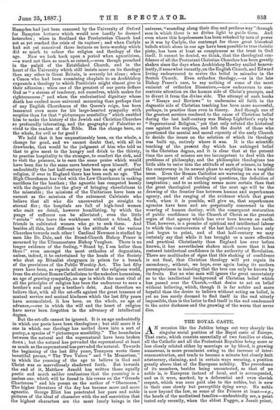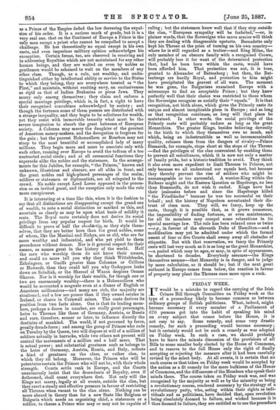THE ROYAL CASTE.
AN occasion like the Jubilee brings out very sharply the singular social position of the Royal caste of Europe. That caste, which consists essentially of two families or clans, all the Catholic and all the Protestant Royalties being more or less closely related either by marriage or by blood, is growing numerous, is more prominent owing to the increase of inter- communication, and tends to become a minute but closely knit aristocracy, claiming, and in certain ways securing, a position greatly above that of the European nobility. The precedence of its members, besides being uncontested, as that of no noble is, is European instead of local, and is accompanied, and as it were, marked, by a deferential and even slavish respect, which was once paid also to the nobles, but is now in their case slowly but perceptibly dying away. No noble is now beyond the law, as some of the Princes at least—e.g., the heads of the mediatised families—undoubtedly are, a point tested only recently, when the eldest Fagger, a Jesuit priest,
as a Prince of the Empire defied the law decreeing the expul- sion of his order. It is a curious mark of grade, but it is a very real one, that on the Continent of Europe a Prince is the orfly man except a priest who cannot be compelled to accept a • challenge. He has theoretically no equal except in his own caste, and even imperious military opinion acknowledges his exemption. Certain forms, too, are observed in receiving and in addressing Royalties which are not maintained for any other human beings, and they are waited on even by nobles as gentlemen would be ashamed to wait on the members of any other class. Though, as a rule, not wealthy, and undis- tinguished either by intellectual ability or service to the States to which they belong, they are everywhere treated as "the First," and maintain, without exciting envy, an exclusiveness as rigid as that of Indian Brahmins or pious Jews. They marry only among themselves ; they claim and enforce a special marriage privilege, which is, in fact, a right to have their recognised concubines acknowledged by society ; and though the fortunes some of them possess are distributed with a strange inequality, and they begin to be solicitous for wealth, yet they resist with immovable tenacity what must be the severe temptation to absorb the great heiresses of European society. A Colonna may marry the daughter of the greatest of American money-makers, and the derogation is forgiven for the gain ; but the poorest Hohenzollern or Bourbon may not stoop to the most beautiful or accomplished lady of many millions. They begin more and more to associate only with each other, roaming over Europe to avoid the tedium of a too contracted social circle ; and at all ceremonial functions they supersede alike the nobles and the statesmen. In the arrange- ments for this Jubilee, for example, "the Princes," known and unknown, illustrious and obscure, are all alike in front, and the great nobles and high-placed personages of the realm, soldiers or statesmen or diplomatists, are all relegated to the crowd. No noble except Lord Lome appeared in the proces- sion as an invited guest, and the exception only made the rule more conspicuous.
It is interesting at a time like this, when it is the fashion to say that all distinctions are disappearing except the grand one of wealth, to note a social distinction so marked as this, and ascertain as clearly as may be upon what basis of solidity it rests. The Royal caste certainly does not derive its social privilege from any popular respect for birth. It would be difficult to prove of half the ebenbarlig, as they style them- selves, that they are better born than the great nobles, some of whom, like the Massimi and Zichys, are as old, who are far more wealthy and influential, and who yet yield to them precedence without demur. Nor is it general respect for their names, as names great in the history of the world. Half the men who worship them do not know their names, and could no more tell you why they think Wittelsbachs, Zahringens, or Gaelfs greater than Colonnas or Crillons or Rewards, than they could tell you why Oodeypore looks down on Scindiah, or the Shereef of Wazan despises Osman Ghazee. Nor is it worship for their wealth, for though one or two are enormously wealthy—there is a Hohenzollern who would be accounted a magnate even at a dinner of English or American millionaires—and many are rich, the majority are straitenei, and a few are poorer than if they owned estates in Ireland, or shares in Cornwall mines. The caste derives its position from two facts alone. One is that its leading mem- bers, perhaps a dozen in number, are really great personages, heirs to Thrones like those of Germany, Austria, or Russia and sure, therefore, sooner or later, to influence directly the destinies of mankind. The world, if not governed by force, greatly dreads force ; and among the group of Princes who rode on Tuesday by the Queen, two will dispose at will of a million of soldiers actually in barracks, while two others not present will control the movements of a million and a half more. That is actual power; and substantial greatness such as belongs to the heirs of Germany, Austria, Russia, and Italy, reflects a -kind of greatness on the class, or rather clan, to which they all belong. Moreover, the Princes who will be potentates sustain the Princes who will not be, with their whole strength. Courts settle rank in Europe, and the Courts unanimously insist that the decendants of Royalty, even if dethroned, shall count everywhere first. Not only will the
Kings not marry, legally at all events, outside the clan, but they exert a steady and effective pressure in favour of restricting all Thrones when vacant to the clan alone. Nothing can be more absurd in theory than for a new State like Belgium or Bulgaria which needs an organising chief, a statesman or a soldier, to choose a Prince who may or may not be capable of
ruling ; but the statesmen know well that if they step outside the clan, "European sympathy will be forfeited,"—or, in plainer words, that the Sovereigns who move armies will think they are dealing with disagreeable upstarts. Bernadotte only kept his Throne at the price of turning on his own country— where he is still regarded as a traitor—and King Milan, the only member of an obscure family with a recognised Crown, will probably lose it for want of the determined protection that, had he been born within the caste, would have been afforded him. That protection was not, it is true, granted to Alexander of Battenberg ; but then, the Bat- tenbergs are hardly Royal, and protection to him might have precipitated the gravest of all wars. The moment he was gone, the Bulgarians examined Europe with a microscope to find an acceptable Prince ; but they knew perfectly well that their choice was restricted to those whom the Sovereigns recognise as socially their "equals." It is that recognition, not birth alone, which gives the Princely caste its unique and almost inexplicable place in Europe ; and as long as that recognition continues, to long will that place be maintained. In other words, the social privilege of the Princely caste will probably endure as long as the great Monarchies. The greater Kings, besides believing devoutly in the birth to which they themselves owe so much, and which, being an indestructible as well as incommunicable quality, releases them from the dangers of rivalry—Prince Bismarck, for example, stops short at the steps of the Throne —find the privileges of the clan convenient by enabling them to prevent all misalliances, which it is now not only a matter of family pride, but a historic tradition to avoid. They think it also even more expedient to limit Thrones to Princes, not only because we all understand our equals best, but because they thereby prevent the rise of soldiers who might be unmanageable or too successful. A warrior-King within the Balkans might end the Eastern Question as Hapsburgs, no less than Romanoffs, do not wish it ended. Kings have had their jealousies before and since the Hapsburgs killed "the Friedlander" because he was too successful on their behalf ; and the history of Napoleon accentuated their dis- trust of risen men. They will, we fancy, keep up the caste, though it is possible that, as it grows numerous, the impossibility of finding fortunes, or even maintenance, for all its members may compel some relaxations in its special marriage law. The rule has been relaxed ones or twice —e.g., in favour of the eleventh Duke of Hamilton—and a modification may yet be admitted under which the formal assent of four or five Courts shall sweep away all obstacles of etiquette. But with that reservation, we fancy the Princely caste will last very much as it is as long as the great Monarchies, —a period which may be ages, or may, in spite of appearances, be shortened to decades. Everybody assumes—the Kings themselves assume—that Monarchy is in danger, and to judge by mere calculation, so it should be ; but if the next great outburst in Europe comes from below, the reaction in favour of property may plant the Thrones once more upon a rock.



































 Previous page
Previous page